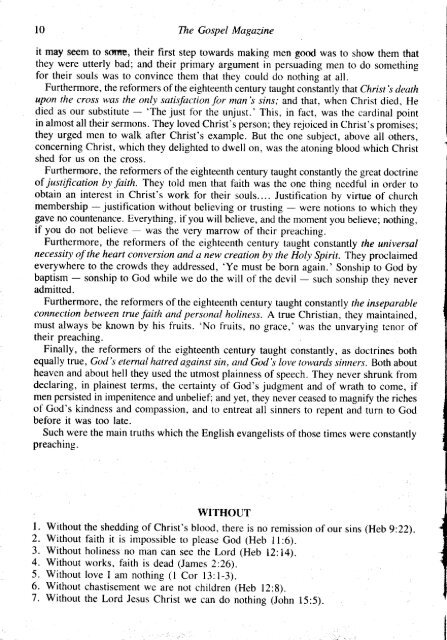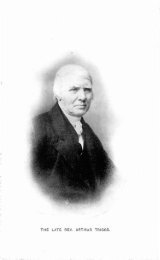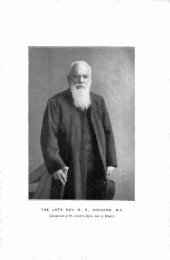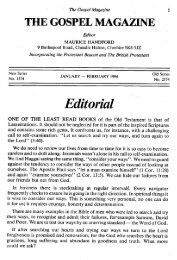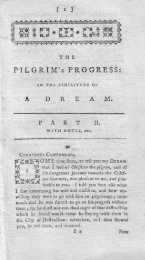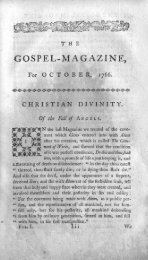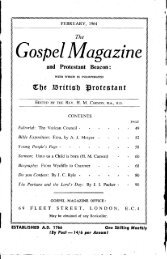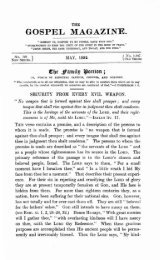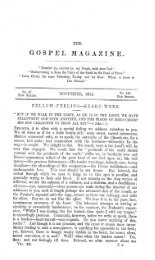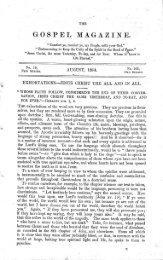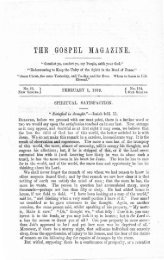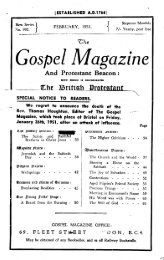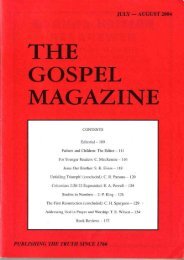January-February - The Gospel Magazine
January-February - The Gospel Magazine
January-February - The Gospel Magazine
Create successful ePaper yourself
Turn your PDF publications into a flip-book with our unique Google optimized e-Paper software.
l0<br />
<strong>The</strong> <strong>Gospel</strong> <strong>Magazine</strong><br />
it may seem to strne, their first step towards making men good was to show them that<br />
they were utterly bad; and their primary argument in persuading men to do something<br />
for their souls was to convince them that they could do nothing at all.<br />
Furthermore, the reformers of the eighteenth century taught constantly that Christ's death<br />
upon the cross was the only satisfaction for man's sins,' and that, when Christ died, He<br />
died as our substitute - '<strong>The</strong> just for the unjust.' This, in fact, was the cardinal point<br />
in almost all their sermons. <strong>The</strong>y loved Christ's person; they rejoiced in Christ's promises;<br />
they urged men to walk after Christ's example. But the one subject, above all others,<br />
concerning Christ, which they delighted to dwell on, was the atoning blood which Christ<br />
shed for us on the cross.<br />
Furthermore, the reformers of the eighteenth century taught constantly the great doctrine<br />
of justifi.cation bv faith. <strong>The</strong>y told men that faith was the one thing needful in order to<br />
obtain an interest in Christ's work for their souls.... Justification by virtue of church<br />
membership - justification without believing or trusting - were notions to which they<br />
gave no countenance. Everything, if you will believe, and the moment you believe; nothing,<br />
if you do not believe - was the very marrow of their preaching.<br />
Furthermore, the reformers of the eighteenth century taught constantly the universal<br />
necessity of the heart conversion and a new creation by the Holy Spirit. <strong>The</strong>y proclaimed<br />
everywhere to the crowds they addressed,<br />
'Ye must be born again.'Sonship to God by<br />
baptism - sonship to God while we do the will of the devil - such sonship they never<br />
admitted.<br />
Furthermore, the reformers of the eighteenth century taught constantly the inseparable<br />
connection between true faith and personal holiness. A true Christian, they maintained,<br />
must always be known by his fruits. 'No fruits, no grace,' was the unvarying tenor of<br />
their preaching.<br />
Finally, the reformers of the eighteenth century taught constantly, as doctrines both<br />
equally true, God's eterrutl hatred against sin, and God's love towards sinners. Both about<br />
heaven and about hell they used the utmost plainness of speech. <strong>The</strong>y never shrunk from<br />
declaring, in plainest terms, the certainty of God's judgment and of wrath to come, if<br />
men persisted in impenitence and unbelief; and yet, they never ceased to magni$ the riches<br />
of God's kindness and compassion, and to entreat all sinners to repent and turn to God<br />
before it was too late.<br />
Such were the main truths which the English evangelists of those times were constantly<br />
preaching.<br />
. WITHOUT<br />
l. Without the shedding of Christ's blood. there is no remission of our sins (Heb 9:22).<br />
2. Without faith it is impossible to please God (Heb ll:6).<br />
3. Without holiness no man can see the Lord (Heb 12:14).<br />
4. Without works, faith is dead (James 2:26).<br />
5. Without love I am nothing (l Cor l3:l-3).<br />
6. Without chastisement we are not children (Heb l2:8).<br />
7. Without the Lord Jesus Christ we can do nothing (John l5:5).<br />
{<br />
I1<br />
-i<br />
I


